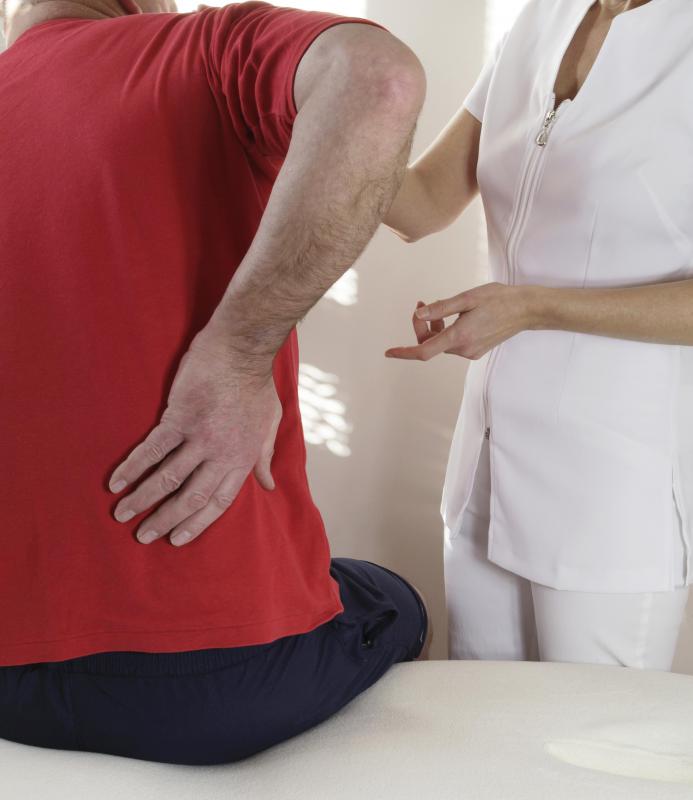At TheHealthBoard, we're committed to delivering accurate, trustworthy information. Our expert-authored content is rigorously fact-checked and sourced from credible authorities. Discover how we uphold the highest standards in providing you with reliable knowledge.
What is Snapping Hip Syndrome?
Snapping hip syndrome is a joint condition that causes shifting in the connective tissue which protects the hips. As the hip joints move or bend, a distinctive snapping feeling occurs due to the repositioning of the connective tissue. The condition tends to occur most often in athletes, especially dancers, gymnasts, and runners.
The main symptom of snapping hip syndrome is a slight displacement or cracking noise when a person flexes his or her hip joints, such as during walking or kicking. Mild cases of the syndrome do not usually result in discomfort or pain and may lessen or totally subside once a person reduces his or her physical activity. If the syndrome becomes more severe, a person may experience a sharp pain in the groin region in addition to the snapping sound.

The hip joints are connected to the thigh bones with a thick band of tissue. This tissue is responsible for helping to reduce the friction between the joints and bones during movement. If the hip joint is frequently moved or flexed within a short period of time, the connective tissue can loosen and no longer be able to fully cushion the area between the hip joints and thigh bones. As the hip rubs against the thigh bones, it makes a cracking sound indicative of snapping hip syndrome.

Mild cases of snapping hip syndrome do not cause tenderness or pain and usually require no medical treatment. The syndrome may subside if a person stops repetitively moving the area. Over the counter anti-inflammatory drugs can help reduce any swelling or pain that does occur in the hip area.
Professional medical treatment may be necessary if the hip starts to become severely painful or if movement becomes difficult. Serious cases of snapping hip syndrome typically occur if the connective tissue is completely worn off due to excessively frequent hip joint movements. A surgeon may then have to make a small incision near the joint area and repair the damaged connective tissue if it cannot heal on its own.

Even with treatment, any person who continuously moves and flexes his or her hips is at risk for developing the syndrome. In order to prevent it from being a constant issue that inhibits athletic performance or comfortably movement, a person can stretch the muscles near his or her hips thoroughly before engaging in physical activity. Stretching those muscles can help gently loosen the connective tissues and prepare them for movement, so they will be less likely to become displaced due to sudden jarring movements.
AS FEATURED ON:
AS FEATURED ON:


















Discussion Comments
Snapping hip syndrome is like the soccer player disease. I don't know anyone on my team who doesn't have it!
@ddljohn-- I can't say that I've cured my snapping hip syndrome but it has been doing a lot better because of several things. I started seeing a chiropractor for one. Second, I've been doing different kinds of stretching exercises to strengthen the tendons and muscles of the hip. You can find lots of online videos on this. Finally, I haven't been pushing myself at all.
I know you want to go back to jogging but that will just make things worse right now. You need to let things heal which can only happen with rest. It takes time, so be patient. It's encouraging that you don't have any hip joint pain, I think it will heal on its own.
I've had this syndrome for a while. I jog regularly and my hip started to snap while jogging suddenly about five months ago.
My doctor didn't find anything wrong with me and told me that I just have to accept it. I have tried doing stretching hip exercises before I start jogging but it hasn't made any difference. I don't have pain but the snapping is very annoying so I haven't jogged in two months.
I don't know if I'm ever going to be able to return to jogging. Since I don't have pain, I doubt my doctor would want to operate. But I certainly don't want to just accept this.
Post your comments